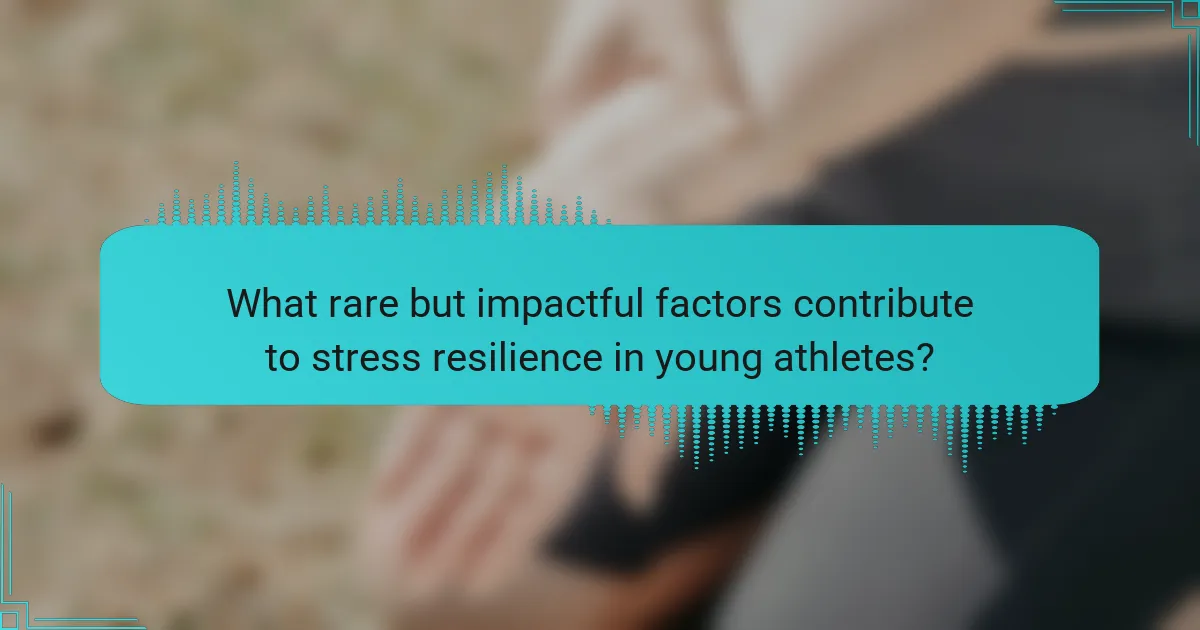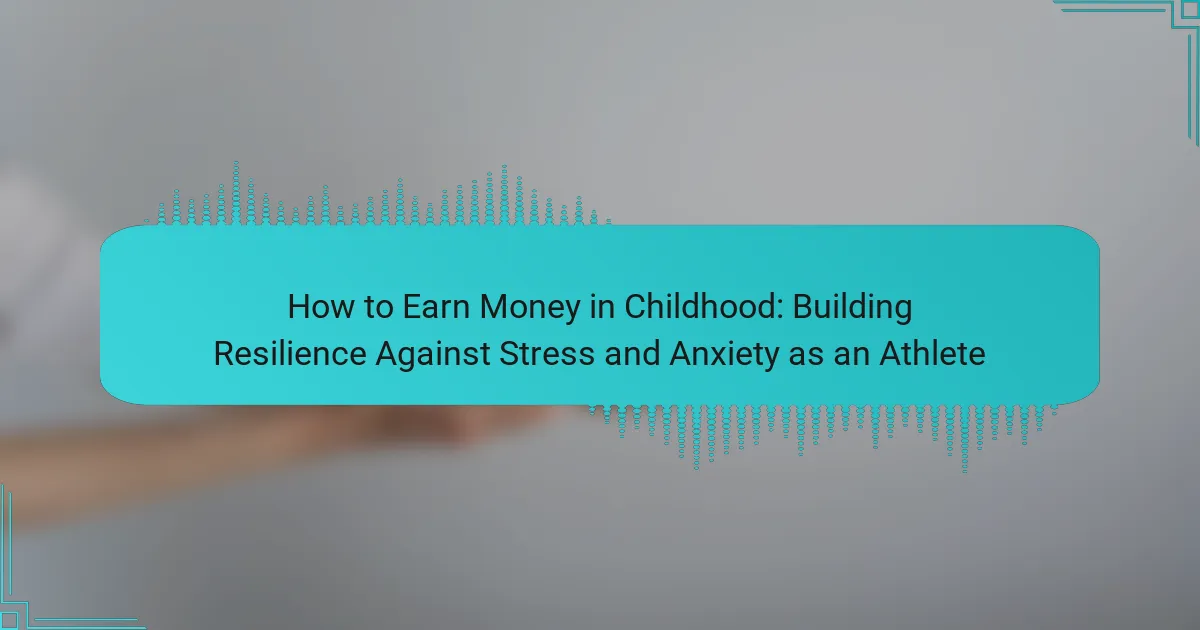Earning money as a young athlete can be challenging, especially when balancing stress and anxiety. This article explores how childhood experiences shape resilience, the importance of supportive relationships, and effective coping strategies. It also addresses the unique pressures faced by female athletes and the role of emotional intelligence in managing stress. Finally, it emphasizes the need for time management and self-care to maintain overall well-being.

How can childhood experiences shape an athlete’s ability to cope with stress and anxiety?
Childhood experiences significantly influence an athlete’s ability to manage stress and anxiety. Early exposure to competitive environments fosters resilience, teaching coping strategies.
Athletes who face challenges during childhood often develop unique attributes, such as grit and perseverance. These qualities enable them to handle pressure more effectively in their sports careers.
Moreover, supportive relationships with coaches and peers during formative years can enhance emotional regulation. Such connections provide a safety net, allowing athletes to express their anxieties and receive guidance.
In summary, nurturing childhood experiences build a foundation for resilience, equipping athletes with essential tools to cope with stress and anxiety throughout their careers.
What are the common stressors faced by young athletes?
Young athletes commonly face stressors such as performance pressure, academic demands, and injury concerns. These factors can lead to anxiety and affect their overall well-being.
Performance pressure arises from expectations to excel in sports, often fueled by coaches, parents, and peers. Academic demands add another layer of stress, as young athletes must balance schoolwork with training schedules. Injury concerns are significant, as the fear of setbacks can impact both physical and mental health.
Additionally, social dynamics play a role; young athletes may experience isolation or competition among peers. These stressors can hinder their ability to build resilience, making it crucial to address mental health and coping strategies early on.
How does competition impact mental health in childhood athletes?
Competition can negatively impact mental health in childhood athletes by increasing stress and anxiety levels. High expectations and performance pressure may lead to burnout and decreased self-esteem. Studies show that 60% of young athletes experience anxiety related to competition, which can hinder their enjoyment of sports. Building resilience through supportive environments and coping strategies is essential for maintaining mental well-being. Encouraging a balanced approach to competition fosters a healthier mindset and enhances overall athletic development.
What role does parental pressure play in athlete anxiety?
Parental pressure significantly contributes to athlete anxiety by creating unrealistic expectations. This pressure can lead to stress, impacting performance and mental health. Studies indicate that athletes under high parental expectations often experience increased anxiety levels, which can hinder their ability to compete effectively. Balancing encouragement with realistic goals is essential for fostering resilience and reducing anxiety in young athletes.
How do social dynamics affect an athlete’s mental state?
Social dynamics significantly influence an athlete’s mental state by shaping their resilience against stress and anxiety. Supportive relationships foster confidence, while negative interactions can lead to increased pressure and self-doubt. For example, camaraderie among teammates enhances motivation, promoting a positive mindset. Conversely, criticism from coaches or peers may trigger anxiety, impacting performance. Building resilience through social support networks is crucial for managing these dynamics effectively.

What are effective coping strategies for young athletes?
Effective coping strategies for young athletes include developing a strong support system, practicing mindfulness, and setting realistic goals. A supportive environment helps manage stress and reinforces resilience. Mindfulness techniques, such as deep breathing and visualization, reduce anxiety and enhance focus. Setting achievable goals fosters a sense of accomplishment and motivation, crucial for mental well-being.
How can mindfulness techniques help manage stress?
Mindfulness techniques can significantly reduce stress by promoting awareness and acceptance. These methods help athletes manage anxiety, enhancing performance. Techniques such as deep breathing, body scans, and meditation cultivate resilience. Research indicates that regular practice lowers cortisol levels, improving emotional regulation. Mindfulness also fosters focus, allowing athletes to stay present during competitions.
What role does physical training play in reducing anxiety?
Physical training significantly reduces anxiety by enhancing physical fitness and promoting mental resilience. Regular exercise releases endorphins, which improve mood and alleviate stress. Athletes often experience lower anxiety levels due to structured training routines that build discipline and coping strategies. Additionally, physical training fosters social connections through team dynamics, further supporting emotional well-being.
How can young athletes develop a support network?
Young athletes can develop a support network by engaging with coaches, teammates, and mentors. Building these connections fosters resilience against stress and anxiety.
Participating in team activities enhances camaraderie, while open communication with coaches provides guidance. Seeking mentorship from experienced athletes offers valuable insights and encouragement.
Involvement in community sports programs expands social circles, creating a robust support system. This network not only aids emotional well-being but also contributes to athletic development.
Ultimately, a strong support network equips young athletes with the resources to navigate challenges and thrive in their pursuits.
What are the benefits of mentorship in sports?
Mentorship in sports offers numerous benefits that enhance an athlete’s development. It fosters resilience against stress and anxiety, crucial for young athletes. Mentors provide guidance, emotional support, and accountability, helping athletes navigate challenges. This relationship often leads to improved performance, increased confidence, and better coping strategies. As a result, athletes learn to manage pressure effectively, which is essential for long-term success.
How can peer support enhance resilience?
Peer support significantly enhances resilience by providing emotional backing, fostering a sense of belonging, and sharing coping strategies. This support system helps young athletes manage stress and anxiety effectively. Engaging with peers allows athletes to express feelings, reducing isolation. Research indicates that athletes with strong peer networks report higher resilience levels, enabling them to face challenges with confidence.

What unique challenges do female young athletes face regarding stress?
Female young athletes face unique challenges regarding stress, including performance pressure and body image concerns. These athletes often experience heightened expectations from coaches, parents, and peers, which can lead to anxiety. Additionally, societal standards about appearance can negatively impact their self-esteem, making it harder to focus on their sport. Research indicates that nearly 50% of young female athletes report feeling stressed about their performance, which can affect their overall mental health. Creating supportive environments and promoting open discussions about these challenges can help build resilience against stress and anxiety.
How does gender influence stress and anxiety in sports?
Gender significantly influences stress and anxiety levels in sports, impacting performance and mental health. Research indicates that female athletes often experience higher anxiety levels due to societal pressures and expectations. In contrast, male athletes may face stress related to competition and aggression. Understanding these differences can help tailor support strategies, fostering resilience in young athletes. Programs focusing on mental health awareness can effectively address these unique challenges, promoting well-being and performance.
What specific coping strategies can benefit female athletes?
Female athletes can benefit from coping strategies like mindfulness, time management, and social support. Mindfulness practices reduce stress and enhance focus. Effective time management balances training and personal life, preventing burnout. Social support from peers and coaches fosters resilience and emotional well-being. These strategies build a strong foundation for managing stress and anxiety.

What rare but impactful factors contribute to stress resilience in young athletes?
Building stress resilience in young athletes involves rare but impactful factors such as emotional intelligence, social support, and adaptive coping strategies. Emotional intelligence helps athletes recognize and manage their emotions, enhancing performance under pressure. Strong social support networks provide encouragement and resources, fostering a sense of belonging. Adaptive coping strategies, like problem-solving and positive reframing, enable athletes to navigate challenges effectively. These attributes collectively contribute to a robust foundation for resilience, ultimately benefiting their athletic journey and mental well-being.
How does early exposure to competitive environments influence mental toughness?
Early exposure to competitive environments significantly enhances mental toughness by fostering resilience and adaptability. Athletes who engage in competition during childhood develop coping strategies for stress and anxiety. This experience builds a strong foundation for handling pressure in various life situations. Studies indicate that children in competitive sports exhibit higher levels of self-discipline and perseverance, essential traits for overcoming challenges. Consequently, these attributes contribute to their overall mental fortitude, preparing them for future adversities.
What is the significance of emotional intelligence in sports performance?
Emotional intelligence significantly enhances sports performance by improving athletes’ resilience against stress and anxiety. It fosters better communication, teamwork, and decision-making under pressure. Athletes with high emotional intelligence can manage their emotions, leading to improved focus and performance consistency. As a result, they are better equipped to handle competitive challenges and maintain mental well-being.

How can young athletes balance earning money and managing stress?
Young athletes can balance earning money and managing stress by prioritising time management, setting realistic goals, and practicing self-care. Effective planning allows them to allocate time for training, work, and relaxation. For example, maintaining a structured schedule helps reduce anxiety.
Developing resilience is crucial. Young athletes should engage in activities that foster mental strength, such as mindfulness or meditation. These practices can alleviate stress and improve focus.
Additionally, seeking support from coaches, parents, or peers can provide guidance and encouragement. Building a strong support network enhances emotional well-being and helps athletes navigate challenges.
Finally, understanding the value of balance is essential. Young athletes must learn to recognise when to step back from work or competition to prioritise their mental health. Establishing boundaries is a key strategy for maintaining overall well-being.
What are the best practices for young athletes to earn money while competing?
Young athletes can earn money while competing through sponsorships, endorsements, and prize winnings. They should build a strong personal brand by leveraging social media and engaging with their audience. Networking with local businesses and participating in competitions with cash prizes can also enhance their income. Additionally, athletes can offer coaching or training sessions to younger peers, creating a diverse income stream.
What common mistakes should young athletes avoid when trying to earn money?
Young athletes should avoid common mistakes like neglecting training, mismanaging finances, and succumbing to peer pressure. First, inconsistent training undermines skill development and resilience. Second, poor financial decisions can lead to unnecessary stress. Lastly, allowing peer influence can divert focus from personal goals. These mistakes hinder both athletic and personal growth.

What expert insights can enhance resilience against stress and anxiety?
Building resilience against stress and anxiety as an athlete involves expert insights on mental conditioning, coping strategies, and support systems. Techniques such as visualization, mindfulness, and goal setting enhance mental strength. Regular physical activity releases endorphins, improving mood and reducing anxiety. Engaging in open communication with coaches and peers fosters a supportive environment. Additionally, understanding the unique challenges of youth athletes helps tailor resilience strategies effectively.
What are the key takeaways from sports psychologists on managing anxiety?
Sports psychologists emphasize that managing anxiety involves developing coping strategies, enhancing focus, and fostering resilience. Key takeaways include practicing mindfulness techniques, setting realistic goals, and maintaining a supportive environment. Athletes are encouraged to visualize success and engage in positive self-talk to combat negative thoughts. Regular physical activity and adequate rest also contribute significantly to anxiety management.
How can young athletes apply these insights to their daily routines?
Young athletes can integrate insights by establishing structured routines that prioritise mental resilience. Incorporating stress management techniques, such as mindfulness and visualization, can enhance focus and performance. Setting specific, achievable goals fosters a sense of accomplishment, reinforcing resilience. Regular physical activity combined with adequate rest supports overall well-being. Engaging in team activities builds social support networks, essential for coping with stress.


